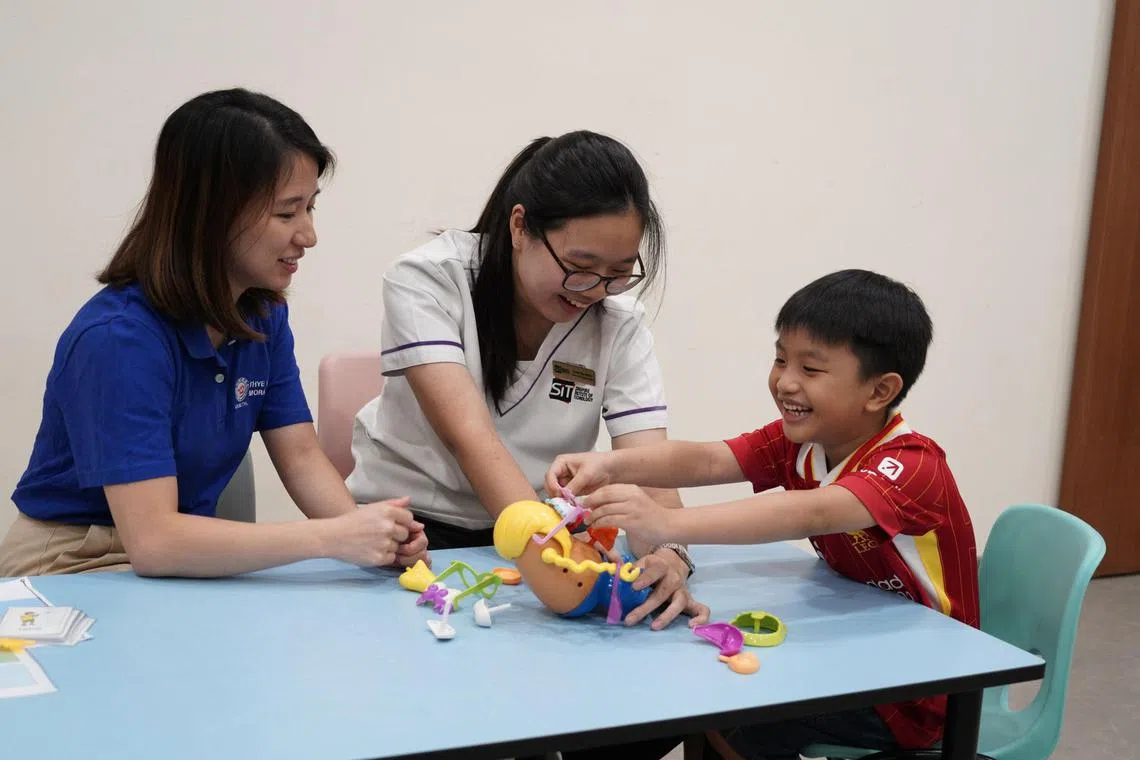Student-run clinic providing affordable speech therapy for children a hit, plans to expand
Sign up now: Get ST's newsletters delivered to your inbox

(From left) Clinical educator Daphlyn Goh, Singapore Institute of technology student Carine Yap and client Abner Lee at the clinic.
PHOTO: THYE HUA KWAN MORAL CHARITIES
SINGAPORE – Car rides used to be a quiet time for the Lee family. At the age of four, Abner Lee could speak only single words when most children his age would be forming sentences.
Two years on, the six-year-old now surprises his parents occasionally by forming sentences that were not taught to him before, said his mother, Mrs Kym Lee, 51.
His progress comes after more than 20 weekly sessions at a speech and language therapy clinic that uses student therapists, in a collaboration between Thye Hua Kwan Moral Charities (THKMC) and the Singapore Institute of Technology (SIT).
“Now he would ask, ‘Daddy, where are we going?’ Sometimes he asks so often that I tell him to be quiet,” his mother, a teacher in an international school, said in jest.
The student clinic started as a pilot project in June 2023 at the THK Children Therapy Centre in MacPherson, which offers other services like physiotherapy and occupational therapy.
To date, the clinic has seen 44 children and plans to expand its services to the THK Children Therapy Space in Queenstown, training at least 12 SIT students yearly at both clinics, up from two in MacPherson now. To meet increasing demand, both clinics will also be training students from the National University of Singapore’s Master of Science (Speech and Language Pathology) programme by the end of 2024.
Ms Karen Lee, assistant director of THK Therapy Services, said it will also be introducing group language programmes, where each pair of students sees three to four children per group.
This could increase the number of children receiving therapy by up to 50 per cent compared with one-on-one therapy currently, and children can expect to be seen as early as within two weeks of registration, she added.
As student therapists are not expected to manage children with multiple learning challenges or more complex cases, children with higher needs are referred to qualified therapists at regular clinics run by THKMC.
At the student clinics, a qualified therapist physically supervises sessions until the student therapists are more confident before transitioning to supervision via closed-circuit television and stepping in when students need support.
Abner started therapy in January 2024 after a two-month wait as there were no student placements when he was registered in November.
As part of their graduation requirement, SIT students must complete five clinical placements across their four years of study. Each placement ranges from four to seven weeks and occurs between January and August.
Currently, the MacPherson student clinic has been piloted for students in their third year and final year, but will be opened up to second-year students to allow more students to undergo training at the clinic by July 2025.
Although Mrs Lee was initially hesitant about the student therapists, she said the price of about $200 for a package of six hourly sessions was affordable, compared with fees of qualified therapists, who could charge more than $100 an hour.
She said having registered therapists to supervise the student-led sessions was also reassuring.
Despite having to travel almost 90 minutes on public transport to the clinic in MacPherson, Mrs Lee plans to continue taking Abner to the student clinic as he is making progress.
In April, six SIT students completed their clinical placements, with one, Ms Carine Yap, 24, about to join the clinic full-time soon as she found the job fulfilling.
During her two-month placement, the speech and language therapy graduate helped more than 10 children, working with up to three children daily, setting therapy targets for them based on their developmental needs.
Depending on the children’s abilities, hobbies and lifestyle, she would tailor sessions to develop their grammar and vocabulary.
When asked if the parents doubted her abilities, Ms Yap said: “The parents knew what they were signing up for. The clinic made it clear and my supervisor was there, so I was not left completely unattended to do whatever.
“It is a safe environment where parents are assured that there’s someone experienced in the room ready to step in any time.”
Associate Professor Valerie Lim, programme leader of speech and language therapy at SIT, said the programme addresses a community need while training budding speech therapists.
“(The programme) not only ensures that children receive timely, quality care but also allows our students to gain confidence in their clinical skills,” Prof Lim said.
“In addition, under the guidance of registered speech language therapists, our senior students have opportunities to mentor their juniors and further hone important skills such as professionalism and lifelong learning.”


